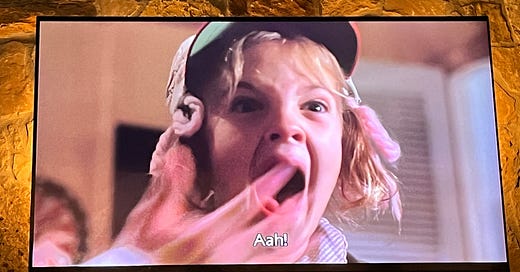The first movie I saw in the theater was E.T. (The Extra Terrestrial), the science fiction pop culture phenomenon from director Steven Spielberg—Summer of 1982.
I”d recently turned eight-years-old, and someone decided I was old enough to sit through a movie with my seventeen-year-old sister. She and her friend even let me sit between them, as I did not want to sit next to a “stranger.”
The protagonist, 10-year-old Elliot, has a harried single-mom, an older brother who is learning to drive, and a 7-year-old sister called Gertie (presumably a nickname for Gertrude). Elliot discovers and befriends the alien E.T., and immediately requires the assistance of his siblings to keep the secret.
Seeing myself as Gertie (played by Drew Barrymore who is six months younger than me) wasn’t exactly a stretch. My oldest brother was off at college and my other brother was close enough to my age that we went to the same elementary school. We both wore our dirty-blonde hair in pigtails with yarn bows. We both had impressive screams (the primary audition requirement according to director Spielberg).

In the movie, I recognized the teasing when her brothers threaten to harm her doll if she “tells Mom.” In the stressful moments of the plot, Gertie clings to her oldest brother for comfort because Mom is busy with Elliot and E.T. Having an older sibling as a pseudo-adult, bonus parent, was familiar to me too.
Once the shock (and screaming) settles down, Gertie has no fear, only curiosity—asking if E.T. is a girl or a boy (Elliot immediately says boy but ultimately, there is never any indication of either gender or sex.)
Then she asks about his lack of clothes. At Gertie’s age, she still bounces between play and pretend and logic as she moves through her world. By asking about E.T.’s clothes, she has immediately assumed E.T. is equal to a human rather than a pet (and therefore probably shouldn’t be naked).
On my rewatch of E.T., I realized how many plot points involved Gertie just being a seven-year-old kid. E.T. brings a pot of dead flowers back to life, and the two are connected and from that point on. Through the flowers, the audience always knows (even if the characters do not) whether E.T. is healthy or sick, alive or dead.
It was Gertie who gave E.T. the pot of flowers in the first place. I doubt either brother put “dead flowers” on the list of items to collect from around the house in her red wagon.
She acts on impulse with generosity and without employing the train of thought that tells us what is practical or necessary in a situation.
Gertie helps E.T. acquire language. After E.T. 's day alone in the house watching TV, she comes home and they watch a bit of Sesame Street together. She easily pronounces each word on screen before the narrator does. The subtle smile on her face looks like satisfaction to me; a skill that doesn’t take effort like it used to. When E.T. also repeats the words, she launches into teacher-mode. Later, Elliot asks a question and E.T. unexpectedly answers. “He can talk now?!” Gertie replies with pride, “I taught him to talk.”
There are so many points in the plot representative of her age. Her willingness to do whatever her big brothers ask, even when it means giving up trick-or-treating (I wonder about a cut scene where deals are made about how much candy she’ll receive as payment). When the doctors shock E.T.'s body with a defibrillator, Gertie has a very close up view, and the horror and fear on her face reminds any hardened viewer just how violent that can be. Gertie is the voice of innocence, asking “Is he dead momma?” for an audience who is asking the same question.
Gertie lacks practice lying effectively and gives away the plot several times—that Elliot is in the woods, that she and her mom are driving off to meet the spaceship returning to E.T. For any viewer that might be confused rather than invested in the action, Gertie provides that clarification.
Of course the representation of a Gertie on screen comes from the attention to character by the screenwriter Melissa Mathison. I can’t claim to know whether she pulled from directly her own life, but she is a writer and clearly knows that paying close attention—to your own memories and the people around you—fuels characterizations that rings true.
I’d love to hear if this walk down movie memory lane sparks anything for you. A memory of any age, a decade, a favorite movie you now want to revisit.
Watch for future issues:
Gertie, not Gertrude.
Portraits of age 7, twenty-five years apart.
Learn more about When We Were Seven.


